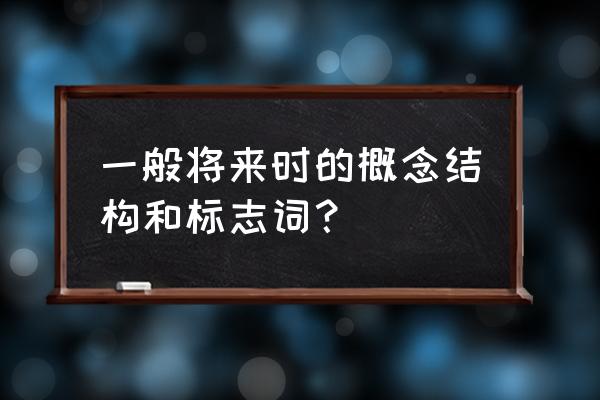一般将来时的基本结构

一般将来时的概念结构和标志词?
一般将来时的概念结构和标志词?
一般将来时的概念就是表示在将来或者未来即将要发生的动作或状态就是表示还没有发生的事情,现在做一个计划或者规划。。一般将来时的结构就是主语加will 或者(be going to 动词原形再加其他。 至此有明天,明年,下周,后天。或者说在未来
一般将来时的概念结构和标志词?
1. 一般将来时的定义
一般将来时表示在现在看来即将要发生的动作或存在的状态。常用时间副词tomorrow, soon或短语next year / week / month, in a few days, in the future, sometime 做状语。如:
What will you do this afternoon. 你今天下午干什么?
We will have a meeting tomorrow. 我们明天要开会。
He is going to study abroad next year. 明年他要出国学习。
2. 一般将来时的结构及应用
(1) shall / will 动词原形。表示即将发生的动作或存在的状态。特别是表示客观性的事情或在某条件下要发生的事情,只能用此结构。如:
What shall we do if he doesn’t come? 如果他不来,我们该怎么办?
Will you be free this evening? 今天晚上有空吗?
I think he will tell us the truth. 我想他会告诉我们真实情况的。
(2) be going to 动词原形。表示已经计划或安排好了的事情,也可表示有迹象表明肯定要发生的事情。如:
We are going to have a meeting to discuss the matter this evening. 今天晚上开会讨论这件事情。
Look at the black clouds over there. I think it is going to rain soon. 看一看那边的乌云,我想天要下雨了。
There is going to be an English evening this week. 本周要举行一个英语晚会。
(3) be to 动词原形。表示一种常规性的活动或注定要做的事情。如:
Who is to clean the classroom today? 今天该谁打扫教室了?
When are you to return your library book? 你什么时候要还图书?
The bridge is to be completed by the end of this yea